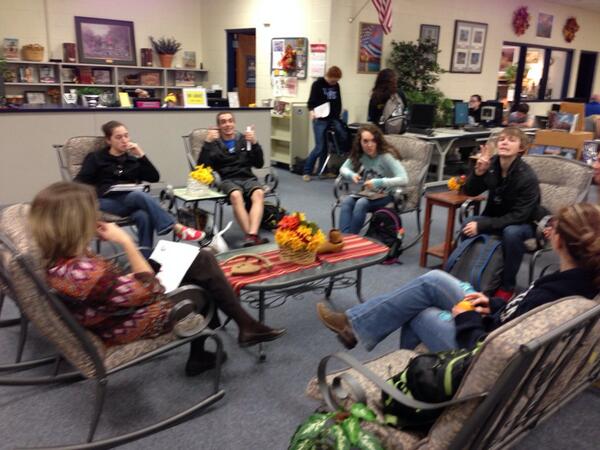That's why it's so important to ask tough questions to make sure the decision is the best one possible with the available knowledge. I want to think through my decisions and test my thinking with questions that help me clarify my values and ensure that I'm acting in a way that is congruent with my beliefs.
1. How can I help you? This first question is the essence of servant leadership, the leadership approach that recognizes leadership is service and turns the old paradigm of leadership on its ear. Leadership is not about power over others, or being in charge. Instead, it is about helping followers be successful. Robert Greenleaf coined the term servant leadership, and he described it as a type of leadership that strives to help followers be healthier, wiser, freer, and better able to be leaders themselves. Leadership does not just create followers who are dependent on the leader, but it creates new leaders who are able to extend their influence and become change agents.
.JPG) So as I make decisions, I must always remember this question, "How can I help you?" Sometimes I need to speak the words aloud and offer to help. Other times my actions and attitudes may demonstrate this mindset even if the words go unspoken. But my goal as a leader must always be to help those around me be the best they can be. If someone in my school needs anything I can help provide to be successful, my job as a leader is to try to move mountains to get it done.
So as I make decisions, I must always remember this question, "How can I help you?" Sometimes I need to speak the words aloud and offer to help. Other times my actions and attitudes may demonstrate this mindset even if the words go unspoken. But my goal as a leader must always be to help those around me be the best they can be. If someone in my school needs anything I can help provide to be successful, my job as a leader is to try to move mountains to get it done.
2. Is this good enough for my own child? Would I want this for my own child? As a parent I will do just about anything to support the success of one of my kids. I want them to have the best opportunities possible. I want them to have the best teachers, and I want them to have experiences in school that cultivate a love of learning and lead them to find who they are as people and as learners.
As I consider situations in my school against this high standard, there are times when I realize we're not quite there yet. There are things that need to improve to best meet the needs of students. I guess there will always be areas to improve, but I don't find this discouraging. Instead, I find it exciting to know that we can create better opportunities and continue to grow so that every student finds optimal success.
I will share that this question has helped me to find clarity on tough decisions in the past. When there are times the task may seem too big or the obstacles insurmountable, asking this question has helped me stay focused. I've also used it with others in my school to help frame a situation on a personal level. Parents don't want excuses about why something can't be done, they want heroic action that overcomes any hindrances and ensures that their student is receiving the best.
3. Will this decision preserve or attack the dignity of a child? This question is an extension of the previous one. It helps me focus on the humanity of a child in each situation. We must always strive to build up and not tear down. We must treat others with dignity and respect. As Todd Whitaker writes, great teachers and principals treat every student like they are good. We must presume positive intentions and come alongside students to help them succeed. When everyone in a school makes decisions that consistently preserve dignity and respect, the culture will be one of mutual cooperation and shared success.
4. As I make this decision, what am I hoping to achieve? Part of effective decsion-making is the ability understand how decisions are going to impact the goals of the individual or organization. I may be justified and have good reasoning for a decision, but if it is going to ultimately hinder the mission of our team, maybe I need to reconsider my decision. There is great finesse and wisdom in knowing how to help others be successful. Sometimes it means overlooking things that might be personal pet-peeves of the leader.
As we make decisions, we should always consider the purpose of the decision and if a particular action will lead to the purpose being accomplished. Moreover, we must consider if the purpose is large enough or is there a higher purpose that might be jeopardized in this decision. Effective leaders see the big-picture.
5. How does this decision impact learning in our school? Some decisions or situations may not affect learning greatly or at all. If this is the case, why make these decisions important in your school. We spent too long trying to solve the issue of whether students should be allowed to wear hats in our building or not. Ultimately, most everyone agreed it really didn't affect learning so why make an issue of it. Other decisions, however, greatly impact learning. We need to have tough discussions about our schedule, course offerings, assignments, and grading. Are we making decisions based on what's best for learning or what's convenient for adults.
6. If you had no fear, what would you do? Sometimes change can be frightening even if we truly believe change is necessary. Fear causes us to hesitate, to think small, and to avoid difficult conversations. We are all governed by fear to one degree or another, but nothing great was ever accomplished without risk and a possibility of failure. We must practice taking risks in small ways and build confidence in our risk-taking to reach for our really big dreams. If a decision is good for students and will improve learning, what are you waiting for? If you had no fear, what would you do?
7. In any situation, how will the best people respond to this decision? There will almost always be critics of any significant or meaningful decision. We cannot please everyone. What's right is not always popular and what's popular is not always right. But in any situation, we should consider what the best people will think. If my very best teachers will not support a decision, then perhaps I need to consider why I feel this is the best decision in the first place. If the best teachers are unable to support a decision, then maybe I need to go back to #4. What exactly do I hope to achieve if even the best people in the building are not on board? But if the best people are supportive, then even in the face of some criticism, a school can successfully move forward.


